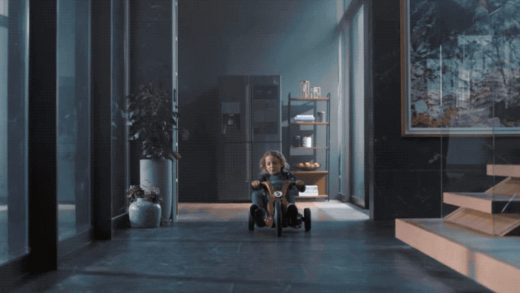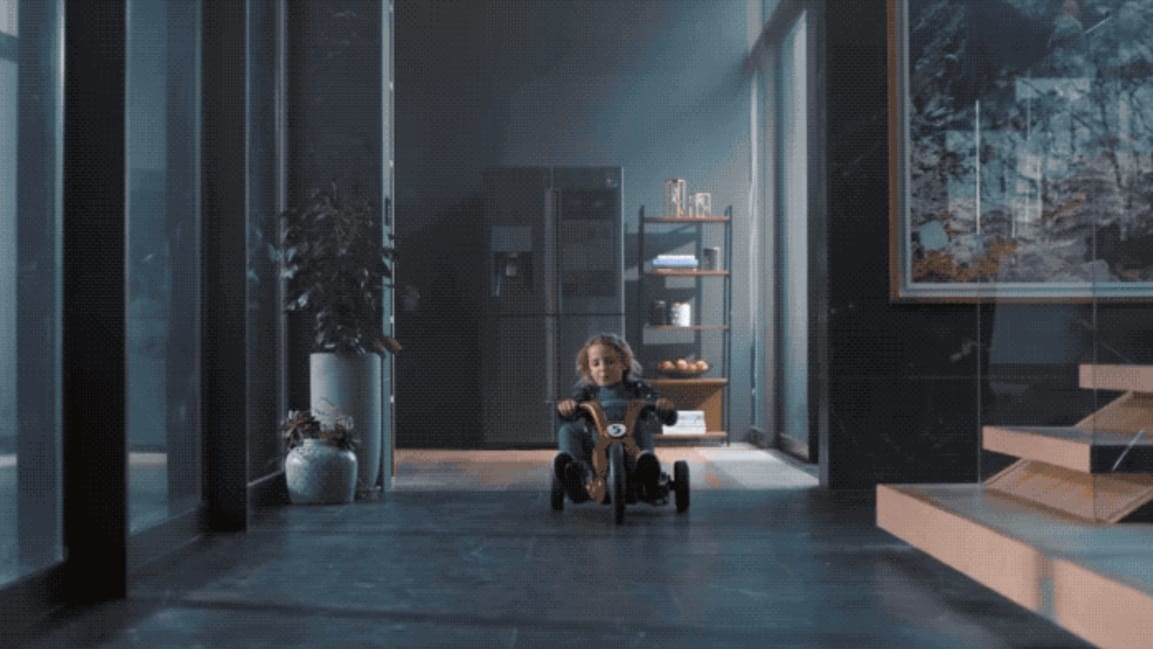Thanks, Samsung, but ads predicting the future should be a thing of the past
Samsung launched a new campaign this week called “The Future,” and it of course gives us a peek at all the amazingly cool tech toys we’ll have in the not-so distant future. A little girl watches cartoons on her home’s giant floor-to-ceiling windows. Minority Report-meets-Top Model as a designer uses three giant mirror screens to create his next collection. A tattoo artist remotely inks someone with the help of a robot arm. A couple shares the magic of an at-home ultrasound. Crowds of people flock to a square as part of a massive multiplayer AR video game. This, dear reader, is THE FUTURE.
Well, the future according to Samsung advertising. But while it’s initially pretty cool–who wouldn’t want to watch TV on the giant windows in a house that almost certainly has a Peloton bike stashed somewhere? But what happens when it doesn’t happen? How do the many Samsung users who experienced an S9 touchscreen dead zone feel about this?
The line Samsung walks with an ad like this dangles precariously between inspiration and disappointment. And in an age when, frankly, nothing surprises most of us anymore, it’s a line it doesn’t need to walk at all.
Brands have been predicting the future for eons. Most famously in 1993 when AT&T’s “You Will” campaign served up some of our first glimpses of tablets, smartwatches, GPS, on-demand entertainment, and more–set to the dulcet tones of a Tom Selleck voice-over.
Of course this was pre-internet for the majority of households. The halcyon days of actual phone calls, unskippable ads, and Jerry Seinfeld in mom jeans. It was tough to imagine Robert Downey Jr. as a superhero (Heart and Souls, anyone?), let alone how the information superhighway would shape society over the next 25 years. That’s when companies like AT&T and Apple could surprise and delight us with their visions of the future, because we just didn’t know any better. I mean, Sandra Bullock’s The Net didn’t even come out until 1995 to make us all paranoid.
Here in the 21st century, most pop cultural visions of the future land somewhere on the spectrum between a Black Mirror episode and a climate change-ravaged hellscape. What could any brand possibly predict that would surprise us at this point? Back in 2016, Boeing tried with some light space travel and Mars colonization, but even that isn’t beyond our imagination. The only thing Samsung accomplishes this week is setting itself up for disappointment. A 2017 study published in the Psychological Review found that people actually don’t want to know the future. So nobody really cares about your robot tattoo five years from now. We want to know what you can do for us right now.
As branded futurism goes, the best versions are often the ones that poke fun at where we’re headed. Like when Progressive Insurance took on modern parenthood, or Halo Top ice cream’s retirement home from dessert hell.
When it comes to more earnest takes, the only future I want to see from a brand is one in which the tech is cool, sure, but even cooler is one where our private information is safe, democracy isn’t under siege by systematic disinformation campaigns, the workers making these products are paid a living wage, and the supply chains are sustainable and environmentally responsible. That’s more impressive than watching cartoons on a window.
Unless of course, if you’re a middle school-aged Steph Curry predicting his own NBA stardom. Then all bets are off.
Fast Company , Read Full Story
(29)



